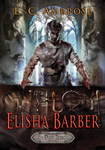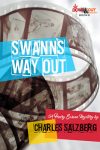

March 27 – April 2: “Does keeping lists distract from writing?”
 Lists, lists and more lists. Does keeping lists help or distract from writing? ITW Members E. C. Ambrose, Charles Salzberg and Nancy J. Cohen weigh in on their list making process this week on the Thriller Roundtable.
Lists, lists and more lists. Does keeping lists help or distract from writing? ITW Members E. C. Ambrose, Charles Salzberg and Nancy J. Cohen weigh in on their list making process this week on the Thriller Roundtable.
~~~~~
 E. C. Ambrose‘s Dark Apostle series of adventure-based historical fantasy novels about medieval surgery continues in volume 4, Elisha Mancer. Her April release will be international thriller The Mongol’s Coffin. In her research, E. C. learned to hunt with a falcon, clear a building of intruders, pull traction, and shoot an AR-15. The author is a graduate of and instructor for the Odyssey Writing workshop. E. C. also works as a guide, leading adventure camps
E. C. Ambrose‘s Dark Apostle series of adventure-based historical fantasy novels about medieval surgery continues in volume 4, Elisha Mancer. Her April release will be international thriller The Mongol’s Coffin. In her research, E. C. learned to hunt with a falcon, clear a building of intruders, pull traction, and shoot an AR-15. The author is a graduate of and instructor for the Odyssey Writing workshop. E. C. also works as a guide, leading adventure camps
 Nancy J. Cohen writes the Bad Hair Day Mysteries featuring South Florida hairstylist Marla Vail. Titles in this series have made the IMBA bestseller list, been selected by Suspense Magazine as best cozy mystery, and won third place in the Arizona Literary Awards. Nancy has also written the instructional guide, Writing the Cozy Mystery. As the author of over twenty published novels, she’s a featured speaker at libraries, conferences, and community events.
Nancy J. Cohen writes the Bad Hair Day Mysteries featuring South Florida hairstylist Marla Vail. Titles in this series have made the IMBA bestseller list, been selected by Suspense Magazine as best cozy mystery, and won third place in the Arizona Literary Awards. Nancy has also written the instructional guide, Writing the Cozy Mystery. As the author of over twenty published novels, she’s a featured speaker at libraries, conferences, and community events.
 Charles Salzberg is the author of the Shamus nominated Swann’s Last Song, and the sequels Swann Dives In, Swann’s Lake of Despair and Swann’s Way Out, as well as Devil in the Hole, named one of the best crime novels of 2013 by Suspense magazine, and “Twist of Fate,” one of three noir crime novellas in Triple Shot. He teaches writing at the New York Writers Workshop where he is a Founding Member.
Charles Salzberg is the author of the Shamus nominated Swann’s Last Song, and the sequels Swann Dives In, Swann’s Lake of Despair and Swann’s Way Out, as well as Devil in the Hole, named one of the best crime novels of 2013 by Suspense magazine, and “Twist of Fate,” one of three noir crime novellas in Triple Shot. He teaches writing at the New York Writers Workshop where he is a Founding Member.
- LAST GIRL MISSING with K.L. Murphy - July 25, 2024
- CHILD OF DUST with Yigal Zur - July 25, 2024
- THE RAVENWOOD CONSPIRACY with Michael Siverling - July 19, 2024
